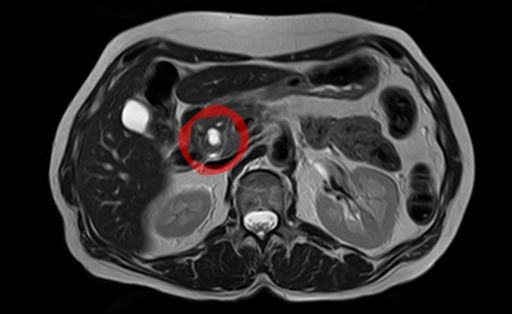Intraductal papillary mucinous neoplasm
Editor-In-Chief: Prab R Tumpati, MD
Obesity, Sleep & Internal medicine
Founder, WikiMD Wellnesspedia &
W8MD medical weight loss NYC and sleep center NYC
| Intraductal papillary mucinous neoplasm | |
|---|---|

| |
| Synonyms | IPMN |
| Pronounce | N/A |
| Specialty | N/A |
| Symptoms | Abdominal pain, jaundice, pancreatitis |
| Complications | Pancreatic cancer, diabetes mellitus |
| Onset | Typically in middle age to elderly |
| Duration | Chronic |
| Types | Main duct, branch duct, mixed type |
| Causes | Unknown |
| Risks | Smoking, chronic pancreatitis, genetic predisposition |
| Diagnosis | MRI, EUS, CT scan, biopsy |
| Differential diagnosis | Pancreatic cyst, mucinous cystic neoplasm, serous cystadenoma |
| Prevention | Regular monitoring, lifestyle changes |
| Treatment | Surgical resection, surveillance |
| Medication | None specific |
| Prognosis | Varies; risk of malignancy |
| Frequency | Increasing with age |
| Deaths | Related to progression to cancer |
Intraductal papillary mucinous neoplasm (IPMN) is a type of pancreatic cyst that can develop into pancreatic cancer. It is characterized by the growth of mucus-producing cells in the pancreatic ducts.
Introduction[edit | edit source]
IPMN is a precancerous lesion that arises from the pancreas, a vital organ that plays essential roles in digestion and hormone production. The pancreas is composed of exocrine and endocrine cells. The exocrine cells produce enzymes that aid in digestion, while the endocrine cells produce hormones like insulin. In IPMN, the exocrine cells, specifically those lining the pancreatic ducts, start to proliferate abnormally, leading to the formation of cysts filled with mucus.
Types[edit | edit source]
There are two main types of IPMN: main duct IPMN and branch duct IPMN. Main duct IPMN involves the main pancreatic duct, while branch duct IPMN involves the smaller side branches. Main duct IPMN is more likely to progress to cancer than branch duct IPMN.
Symptoms[edit | edit source]
Symptoms of IPMN can vary and often depend on the location and size of the cysts. Common symptoms include abdominal pain, nausea, vomiting, weight loss, and jaundice. However, many people with IPMN do not have any symptoms, and the condition is often discovered incidentally during imaging tests for other conditions.
Diagnosis[edit | edit source]
Diagnosis of IPMN typically involves imaging tests such as computed tomography (CT) scan, magnetic resonance imaging (MRI), and endoscopic ultrasound. In some cases, a sample of the cyst fluid may be taken for analysis, a procedure known as fine-needle aspiration.
Treatment[edit | edit source]
The treatment for IPMN depends on several factors, including the type of IPMN, the size of the cysts, the presence of symptoms, and the overall health of the patient. Options may include surveillance, surgical removal of the cysts, or total pancreatectomy in severe cases.
Prognosis[edit | edit source]
The prognosis for IPMN varies depending on the type and stage of the disease. Early detection and treatment can significantly improve the prognosis.
Search WikiMD
Ad.Tired of being Overweight? Try W8MD's physician weight loss program.
Semaglutide (Ozempic / Wegovy and Tirzepatide (Mounjaro / Zepbound) available.
Advertise on WikiMD
|
WikiMD's Wellness Encyclopedia |
| Let Food Be Thy Medicine Medicine Thy Food - Hippocrates |
Translate this page: - East Asian
中文,
日本,
한국어,
South Asian
हिन्दी,
தமிழ்,
తెలుగు,
Urdu,
ಕನ್ನಡ,
Southeast Asian
Indonesian,
Vietnamese,
Thai,
မြန်မာဘာသာ,
বাংলা
European
español,
Deutsch,
français,
Greek,
português do Brasil,
polski,
română,
русский,
Nederlands,
norsk,
svenska,
suomi,
Italian
Middle Eastern & African
عربى,
Turkish,
Persian,
Hebrew,
Afrikaans,
isiZulu,
Kiswahili,
Other
Bulgarian,
Hungarian,
Czech,
Swedish,
മലയാളം,
मराठी,
ਪੰਜਾਬੀ,
ગુજરાતી,
Portuguese,
Ukrainian
Medical Disclaimer: WikiMD is not a substitute for professional medical advice. The information on WikiMD is provided as an information resource only, may be incorrect, outdated or misleading, and is not to be used or relied on for any diagnostic or treatment purposes. Please consult your health care provider before making any healthcare decisions or for guidance about a specific medical condition. WikiMD expressly disclaims responsibility, and shall have no liability, for any damages, loss, injury, or liability whatsoever suffered as a result of your reliance on the information contained in this site. By visiting this site you agree to the foregoing terms and conditions, which may from time to time be changed or supplemented by WikiMD. If you do not agree to the foregoing terms and conditions, you should not enter or use this site. See full disclaimer.
Credits:Most images are courtesy of Wikimedia commons, and templates, categories Wikipedia, licensed under CC BY SA or similar.
Contributors: Prab R. Tumpati, MD



